

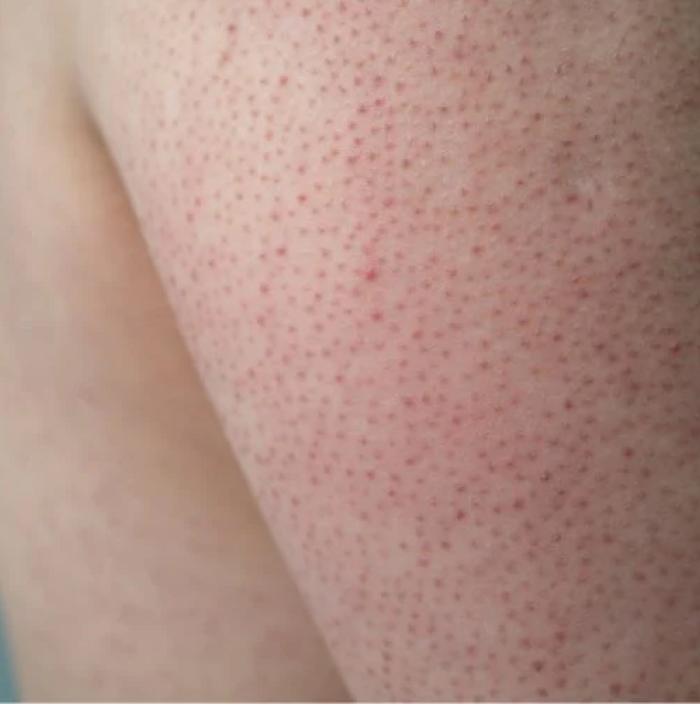
If you’ve been struggling to get rid of persistently dry, rashy bumps on the back of your arms, legs, face, or torso without success, you may have a common yet difficult-to-treat chronic skin condition.
Learn more about the top 5 products that help promote glowing, smooth skin.
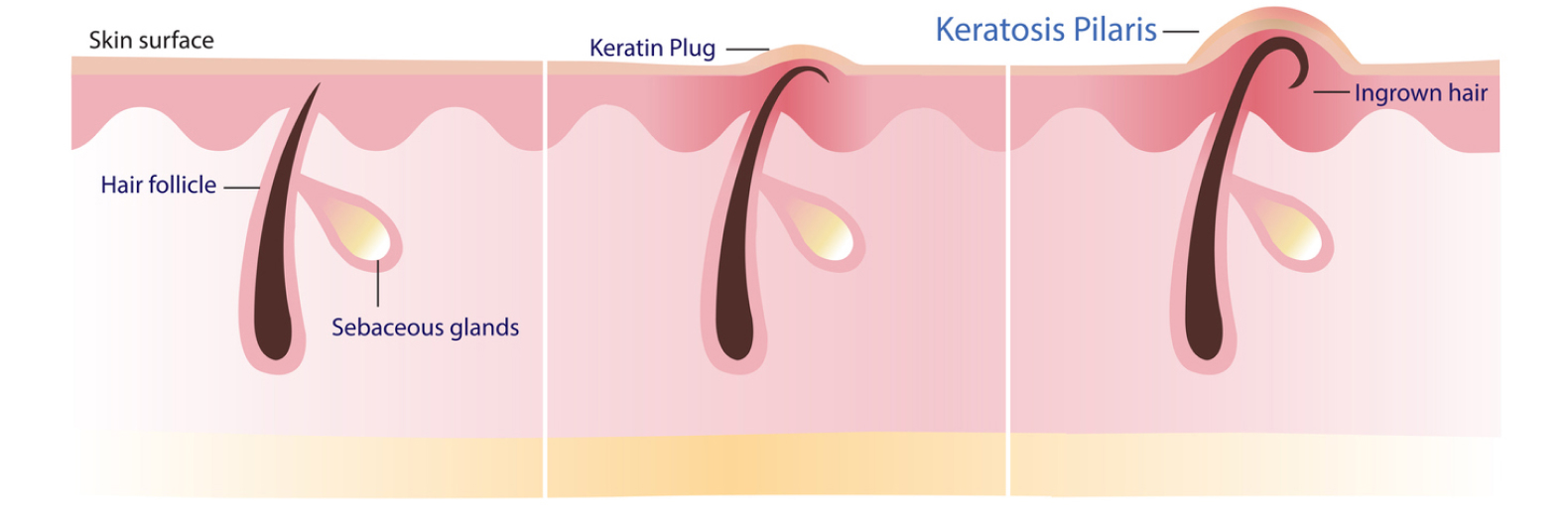
But, not all KP treatments are created equal, and when it comes to choosing a great KP product, there are several things to consider.
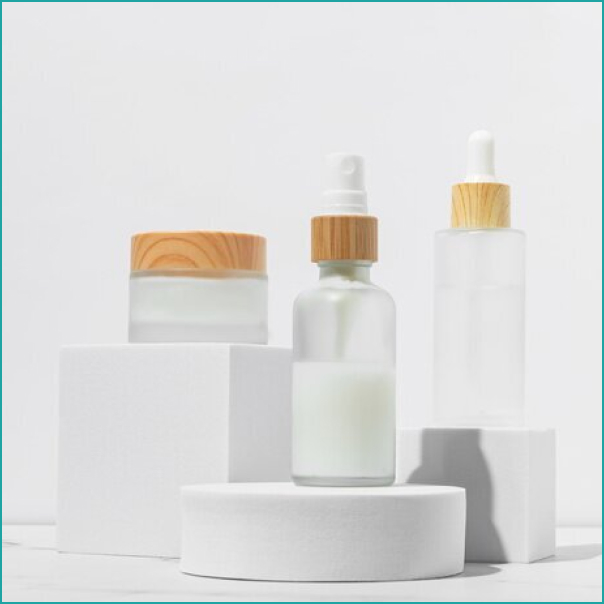
A June 2023 study by Kodali N et al. reported, “Topical keratolytic agents are first-line therapy, followed by topical retinoids…. General cutaneous measures such as hydrating skin should also be recommended.” (Note: Topical keratolytic agents are alpha hydroxy acids like glycolic acid.)
This latest research illustrates the need to treat the many underlying conditions: excess keratin, sluggish cellular turnover, bumps, and dry skin.
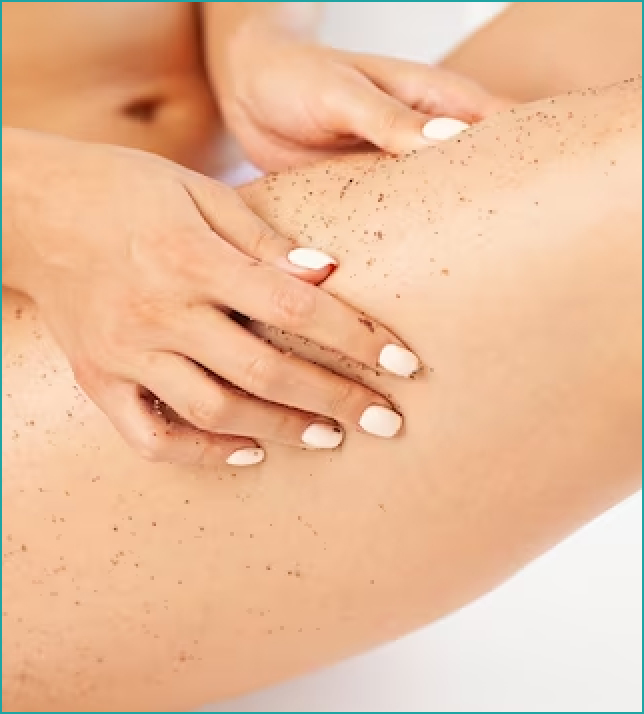
Topical keratolytic is a fancy way of saying alpha hydroxy acids (AHA) and beta hydroxy acids (BHA), which are also known as natural chemical exfoliants. AHAs include lactic acid and glycolic acid, and BHA includes salicylic acid.
These gentle chemical exfoliators break down and sweep away excess keratin, which clogs the pores and causes bumps. Even better is a product that includes gentle physical exfoliation that doesn’t scratch or damage live skin tissue.
For example, jojoba beads are perfectly round, allowing them to roll over the skin, gently polishing away dead, dry, and flaky skin without the sharp cutting edges of exfoliators like walnut and peach pit scrubs.

Using topical retinoids is a must to improve healthy skin cell turnover. Sluggish cell turnover leads to more keratin and dry skin building up on the outer skin layer, contributing to the excess keratin that blocks the follicle, creating bumps and sandpaper-like roughness.
Retinoids are a 50-year gold standard in skin health and are renowned for their ability to increase healthy skin function, encouraging the newer skin cells to the top skin layer.
Hydrating your skin is a MUST! Because it doesn’t just soothe dry skin–it improves the skin’s moisture barrier. A healthy moisture barrier defends against environmental toxins and pathogens.
This outer layer of the skin contains keratin and natural moisture, including cholesterol, fatty acids, and ceramides. Naturally occurring ceramides include rice, wheat, corn, and shea butter.
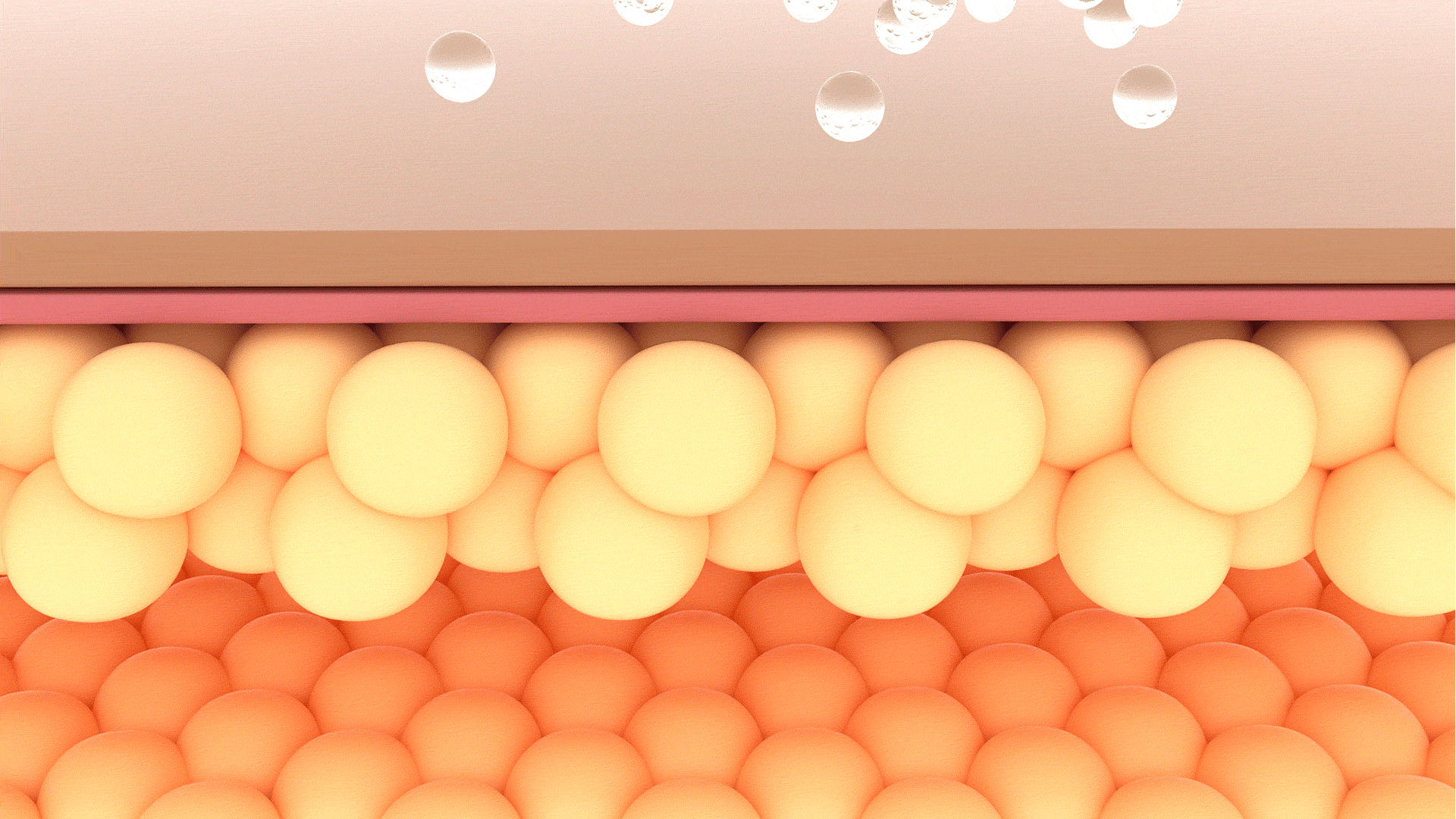
Naturally occurring fatty acids include glycerides, and cholesterols include lanolin. The best moisturizing system for KP utilizes multiple types of skin moisture.
Alcohols, particularly simple alcohols, and astringents like witch hazel, are added to products to help dissolve ingredients. But alcohols leave skin practically oil free, which can over-dry keratosis pilaris skin.
Benzoyl peroxide, one of the best acne-fighting ingredients out there, removes dead skin and excess oil, but its side effects include redness, dryness, and irritation.
For someone suffering from dry skin or KP, these side effects could be problematic.
Salicylic acid can often be found in KP treatments. However, as a BHA lipophilic compound that combines with skin oil like sebum to remove oil within the pores, it can be too drying for KP bumps.
Salicylic acid makes a great acne treatment. But for some people with KP or dry skin, products that contain salicylic acid may increase their symptoms of dry skin, like redness and flaking.
Experiencing significant tightness after washing your face is a sign of a harsh soap. These products can be particularly drying and, even worse, disrupt or damage a healthy skin barrier.
Keep these additional tips in mind when shopping for a keratosis pilaris treatment routine.
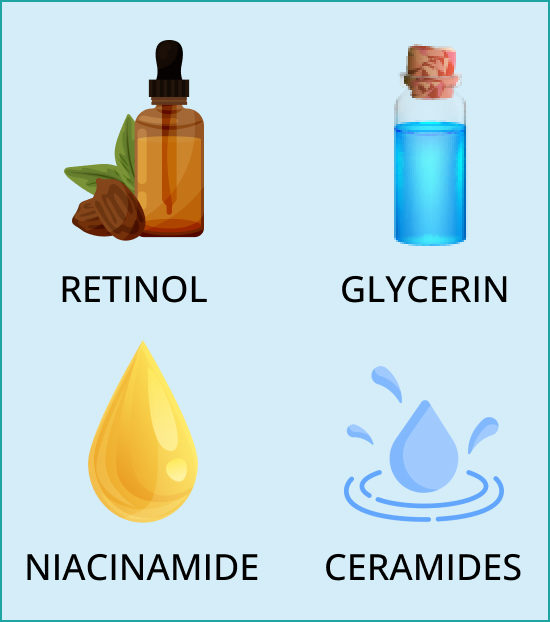
Many brands use quality ingredients but skimp out on clinically studied and effective ingredients. So even if you’re getting good skin ingredients, they might not be those needed to treat the multiple symptoms of KP.
Without the right ingredients, you won’t experience the full benefits. Look for a treatment that lists multiple steps and includes ingredients like AHAs (especially glycolic and lactic acids), retinol, glycerin, niacinamide, and ceramides.
It’s vital to prioritize quality when searching for a keratosis pilaris treatment, even if that means paying a little more for a high-quality, safe formula. Your natural beauty and health are far too valuable to take such a gamble.
 It’s always a good idea to invest in a KP treatment that offers a 100% money-back guarantee. A money-back guarantee shows the company’s faith in its product. Keep on the lookout for brands that offer at least a 30-day money-back guarantee.
It’s always a good idea to invest in a KP treatment that offers a 100% money-back guarantee. A money-back guarantee shows the company’s faith in its product. Keep on the lookout for brands that offer at least a 30-day money-back guarantee.
Get smooth skin and feel-good-look-good confidence with these best KP treatments.
Below are the top 5 products in this category on the market today.
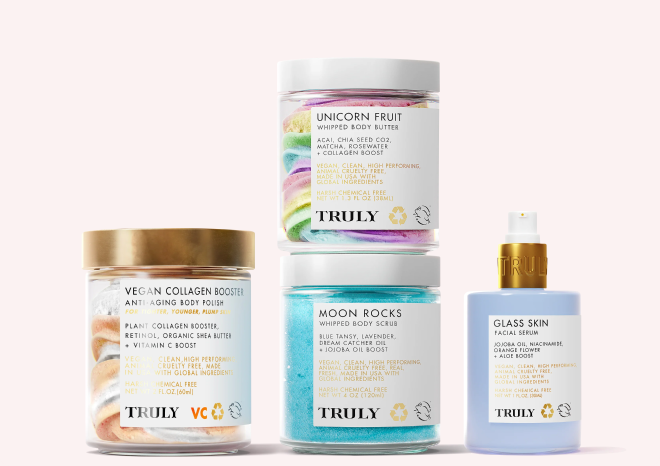
Truly’s KP Treatment Routine treats all of the symptoms of keratosis pilaris.
Truly understands that no single product can do it all – exfoliate (physically and chemically), encourage healthy skin cell turnover, and hydrate.
That’s why Truly’s KP Treatment Routine treats more than one symptom and works wonders on keratosis pilaris and any dry, bumpy, red skin. In Truly’s four-step routine, you’ll resurface, moisturize, and smooth your skin.
Few other brands contain a multitude of high-performance, scientifically studied, and proven ingredients like glycolic acid, niacinamide, retinol, organic shea butter, glycerin, aloe, and jojoba oil.
Truly’s KP Treatment Routine layers multiple moisturizing ingredients to create a healthy moisture barrier and hydrate skin.
Plus, Truly’s KP Treatment Routine has over 2,700 five-star reviews (and counting).
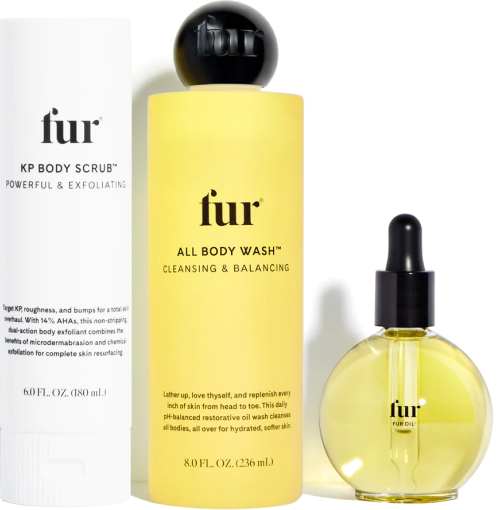
Fur’s KP Kit scrub combines physical exfoliation with the AHA power of lactic acid, making it super effective at removing the excess buildup of keratin.
Redness is soothed with the composition of Fur Oil, which contains grapeseed oil and jojoba oil.
The Fur KP Kit 3-step routine makes for a simple routine that focuses on exfoliation to target the appearance of KP.
Though it’s nice that Fur’s routine uses a straightforward approach to smoothing bumps—it’s lacking in ingredients that encourage healthy cellular turnover, like retinol and multiple forms of moisture. There’s also a drawback with the lofty price ($112) for just three items.
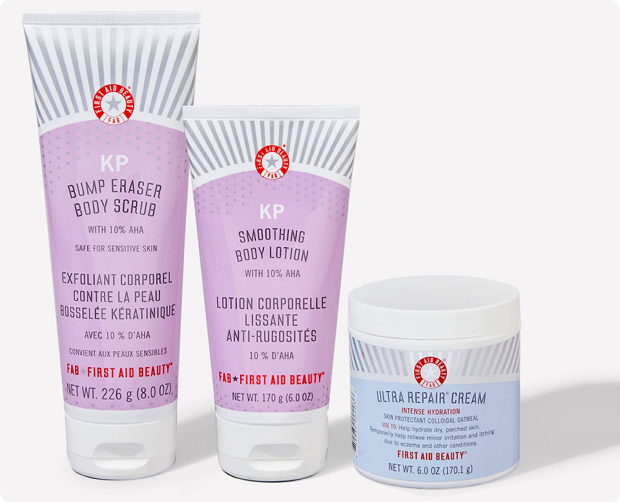
This three-step treatment is highly effective, but those prone to irritation or sensitive skin should follow the instructions closely and start with a small patch test due to the high level 10% AHA, which can easily over-dry your skin.
First Aid Beauty Smooth Skin Trio uses multiple types of hydration, which provides the best results for KP skin.
This treatment lacks ingredients that encourage healthy cellular turnover, like retinol, offers no money-back guarantee, and has higher levels of AHA.
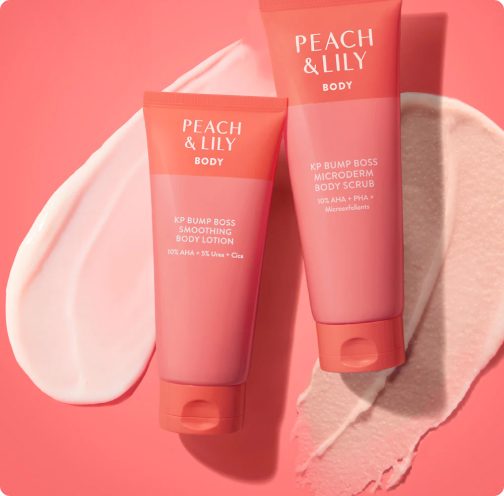
Peach & Lily formulated an exfoliator-meets-moisturizer duo with ingredients that tackle bumps and texture. The scrub uses a 10% AHA and 5% Urea combination to exfoliate the skin, while ingredients like Mugwort, Barley, Cica, and fruit extracts are designed to calm redness and soothe skin.
Again, watch and test your skin with this system as an AHA level of 10% is considered high and possibly over-drying.
This treatment also lacks ingredients that encourage healthy cellular turnover, like retinol, and offers no money-back guarantee.
Also, both products are on the smaller side.
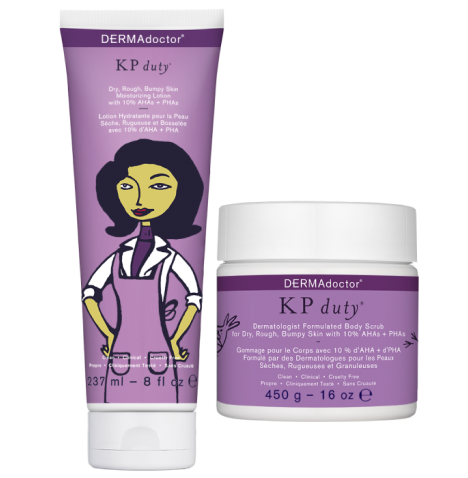
DermAdoctor’s two-step treatment is powerful, mainly due to the high concentrates of AHA (10%) in both steps. This makes it also not a great fit for sensitive skin.
This treatment also lacks ingredients that encourage healthy cellular turnover, like retinol, and offers no money-back guarantee.